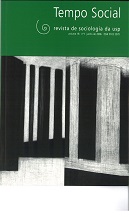"Myriads of eternity": the actuality of E. P. Thompson
DOI:
https://doi.org/10.1590/S0103-20702006000100011Keywords:
E. P. Thompson, English social history, Working class, Industrial revolution, Working class cultureAbstract
The article re-examines the classic work by E. P. Thompson, The making of the English working class, identifying many elements relevant to the study of the contemporary historical context. It criticizes those approaches that look to synthesize a 'Thompsonian method' in a number of recurrently cited formulas found in the preface to the work. It also argues that the persistent appeal of the book can be explained through an analysis of its narrative structure.Downloads
References
ANDERSON, Perry. (1985), Teoría, política e historia: un debate con E. P. Thompson. Madri, Siglo Veinteuno.
ARENDT, Hannah. (2004), As origens do totalitarismo: anti-semitismo, imperialismo, totalitarismo. São Paulo, Companhia das Letras.
ARRIGHI, Giovanni. (1997), O longo século XX: dinheiro, poder e as origens de nosso tempo. 2. ed. Rio de Janeiro/São Paulo, Contraponto/Editora Unesp.
CHAKRABARTY, Dipesh. (1997), “Time of history and time of gods”. In: LOWE, Lisa & LLOYD, David (orgs.). The politics of culture in the shadow of capital. Durham/Londres, Duke University Press, pp. 35-60.
ELEY, Geoff. (2005), Forjando a democracia: a história da esquerda na Europa, 1850-2000. São Paulo, Editora Fundação Perseu Abramo.
FURET, François. (1988), Pensando a Revolução Francesa. Rio de Janeiro, Paz e Terra.
HAUPT, Georges. (1985), “Por que a história do movimento operário?”. Revista Brasileira de História. São Paulo, 5 (10): 208-231, mar./ago.
HAYEK, Friedrich von (org.). (1954), Capitalism and the historians.Chicago, University of Chicago Press.
HILL, Christopher. (1987), O mundo de ponta-cabeça. São Paulo, Companhia das Letras.
HOBSBAWM, Eric J. (1987a), “A formação da cultura da classe operária britânica”. In: Mundos do trabalho. Rio de Janeiro, Paz e Terra, pp. 251-272.
HOBSBAWM, Eric J. (1987b), “História operária e ideologia”. In: Mundos do trabalho. Rio de Janeiro, Paz e Terra, pp. 17-33.
HOBSBAWM, Eric J. (1987c). “O fazer-se da classe operária, 1870-1914”. In: Mundos do trabalho. Rio de Janeiro, Paz e Terra, pp. 273-297.
HOBSBAWM, Eric J. (1990), Ecos da Marselhesa: dois séculos revêem a Revolução Francesa. São Paulo, Companhia das Letras.
JONES, Gareth Stedman. (1983), Languages of class: studies in English working-class history. Cambridge, Cambridge University Press.
JONES, Gareth Stedman. (1996), “The determinist fix: some obstacles to the further development of the linguistic approach to history in the 1990s”. History Workshop Journal, 42: 19-35.
JOYCE, Patrick. (1991), Visions of the people: industrial England and the question of class, 1840-1914. Cambridge, Cambridge University Press.
KIRK, Neville. (2004), “Cultura: costume, comercialização e classe”. In: BATALHA, Cláudio H. M., FORTES, Alexandre & SILVA, Fernando Teixeira da. Culturas de classe: identidade e diversidade na formação do operariado. Campinas, Editora Unicamp, pp. 49-70.
KLEIN, Naomi. (2001), “Reclaiming the commons”. New Left Review 9, maio-junho.
NEGRO, Antonio Luigi. (1996), “Imperfeita ou refeita? O debate sobre o fazer-se da classe trabalhadora inglesa”. Revista Brasileira de História, 16: 31-32.
OLIVEIRA, Francisco. (2003), “O ornitorrinco”. In: Crítica à razão dualista/O ornitorrinco. São Paulo, Boitempo.
POLANYI, Karl. (1980), A grande transformação: as origens de nossa época. Rio de Janeiro, Campus.
SAVAGE, Mike. (2004), “Classe e história do trabalho”. In: BATALHA, Cláudio H. M., FORTES, Alexandre & SILVA, Fernando Teixeira da. Culturas de classe: identidade e diversidade na formação do operariado. Campinas, Editora Unicamp, pp. 25-48.
SCOTT, Joan W. (1999), “Women in the making of the english working class”. In: Gender and the politics of history. New York, Columbia University Press, pp. 68-90.
SEWELL, William J. (1980), Work and revolution in France: the language of labor from the Old Regime to 1848. Cambridge, Cambridge University Press.
SILVER, Beverly J. & SLATER, Eric. (2001), “As origens sociais das hegemonias mundiais”. In: ARRIGHI, Giovanni & SILVER, Beverly J. Caos e governabilidade no moderno sistema mundial. Rio de Janeiro, Contraponto/Editora UFRJ, pp. 161-225.
THOMPSON, E. P. (1981), A miséria da teoria. Rio de Janeiro, Zahar.
THOMPSON, E. P. (1987), A formação da classe operária inglesa. Rio de Janeiro, Paz e Terra, 3 v.
THOMPSON, E. P. (1989), “La sociedad inglesa del siglo XVIII: ¿Lucha de clases sin clases?”. In: Tradición, revuelta y consciencia de clase: estudios sobre la crisis de la sociedad preindustrial. Barcelona, Crítica, pp. 13-61.
THOMPSON, E. P. (1993), “The sale of wives”. In: _____. Customs in common. London, Penguin (trad. port.: Costumes em comum: estudo sobre a cultura popular tradicional, São Paulo, Companhia da Letras, 1998).
THOMPSON, E. P. (2001) “As peculiaridades dos ingleses”. In: SILVA, Sergio & NEGRO, Antonio Luigi (orgs.). As peculiaridades dos ingleses e outros textos. Campinas, Editora da Unicamp.
VOVELLE, Michel. (2000), Jacobinos e jacobinismo. Bauru, Edusc.
WALLERSTEIN, Immanuel. (2001), “Democracy, capitalism, and transformation”. Palestra na Documenta 11, Viena, 16 de março de 2001, Seção “Demokratie als unvollendeter Prozess: Alternativen, Grenzen und Neue Horizonte”, http://www.binghamton.edu/fbc/iw-vien2.htm, consultado em 2 de abril de 2006.
WILLIAMS, Raymond. (1979), Marxismo e literatura. Rio de Janeiro, Zahar.
Downloads
Published
Issue
Section
License
Copyright (c) 2015 Tempo Social

This work is licensed under a Creative Commons Attribution-NonCommercial 4.0 International License.


